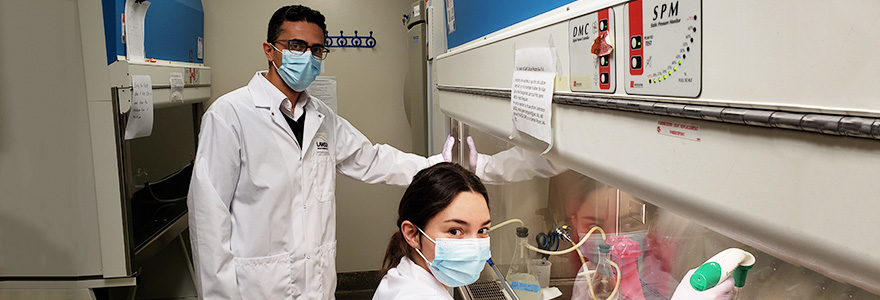Research Projects

- Sensitizing solid tumors to immunotherapy with checkpoint inhibitors via inducing mismatch repair deficiency in the tumor
Tumor cells with mismatch repair deficiency and microsatellite instability show a high response rate to immunotherapy with immune checkpoint inhibitors (ICIs). However, most human cancers do not fall into this category. We induce mismatch repair deficiency in tumor cells and study the consequences of that on the immune phenotype of the tumor and the tumor microenvironment. - Understanding the underlying mechanism of CD39 expression on tumor-specific T-cells
Tumor-specific T-cells express the ectonucleotidase CD39 that is the rate-limiting enzyme in the conversion of ATP to the immunomodulatory molecule adenosine. Our knowledge about the potential positive or negative role of CD39 expression on tumor-specific T-cells is limited. We also do not fully understand why tumor-specific T-cells upregulate CD39 in the tumor microenvironment while bystander T-cells do not express CD39. In the lab, we are studying the underlying mechanisms of CD39 expression on tumor-specific T-cells and how it modulates the anti-tumor functions of these T-cells. - Studying the effect of gut microbiome modification in melanoma patient’s response to immunotherapy
Gut microbiome is shown to play a critical role in activating or suppressing anti-tumor immunity in cancer patients. For the first time in Canada, we are studying the effect of gut microbiome modification in advanced to metastatic melanoma patients via fecal microbiome transplant (FMT) from healthy donors before those patients receive anti-programmed cell death 1 (PD1) immunotherapy. This translational phase I clinical trial (the MIMic trial, NCT03772899) involves researchers from various disciplines including Oncology, Immunology, Microbiology, and Infectious Diseases. We examine the combination effect on patient’s gut microbiome, anti-tumor immune cells, and the clinical response to therapy. - Studying the role of gut microbiome in preventing GI and non-GI toxicities in kidney cancer patients receiving combination immunotherapy
Patients receiving combination immunotherapy with anti-PD1 and anti-CTLA-4 drugs (Nivolumab + Ipilimumab) can develop serious side effects including life-threatening gastrointestinal (GI) side effects such as colitis. In a first in-human phase I clinical trial (NCT04163289), we are studying the effect of modifying the gut microbiome in metastatic renal cell carcinoma patients (mRCC) in preventing the GI and non-GI side effects of combination immunotherapy in those patients. We are also examining the changes in the gut microbiome and immune response after FMT and combination immunotherapy.







